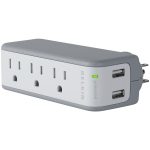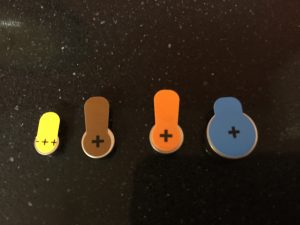The best way not to lose your hearing aids… is to keep them in your ears. If you want to sleep on the plane, just mute them with your smartphone app or slightly open the battery compartment to turn them off.
Beaches
 It’s perfectly ok to wear your hearing aids to the beach. Hearing aids with up-to-date technology have wind cancelling algorithms, but who wants to cancel the beautiful sound of the ocean waves? When it is time to go in the surf, have a Ziploc snack bag in your beach bag to keep the sand and water out of your sophisticated hearing instruments. Place your business card or name and cell phone number in the Ziploc bag – in case a thieving sea gull got hold of them before you did.
It’s perfectly ok to wear your hearing aids to the beach. Hearing aids with up-to-date technology have wind cancelling algorithms, but who wants to cancel the beautiful sound of the ocean waves? When it is time to go in the surf, have a Ziploc snack bag in your beach bag to keep the sand and water out of your sophisticated hearing instruments. Place your business card or name and cell phone number in the Ziploc bag – in case a thieving sea gull got hold of them before you did.
Airports
 Airports can be very noisy and reverberant. Noise and echoing sound waves make hearing difficult, even for normal hearers. It’s easy to be distracted with fast food options, interesting people, flight change announcements, and your intended destination. When you arrive at the departing gate at the airport, tell the flight staff that you are hearing impaired and that you would like to be notified when it is time to board. You must self-identify for the airlines to be know how to assist you. All airlines have policy which follows the Air Carriers Act that includes reasonable accommodations for hearing impaired passengers. The agents will be happy to alert you directly for pre-boarding instructions, awareness of P.A. system announcements, changes in flight time, or gate arrival. Sometimes they will even give you early boarding preference.
Airports can be very noisy and reverberant. Noise and echoing sound waves make hearing difficult, even for normal hearers. It’s easy to be distracted with fast food options, interesting people, flight change announcements, and your intended destination. When you arrive at the departing gate at the airport, tell the flight staff that you are hearing impaired and that you would like to be notified when it is time to board. You must self-identify for the airlines to be know how to assist you. All airlines have policy which follows the Air Carriers Act that includes reasonable accommodations for hearing impaired passengers. The agents will be happy to alert you directly for pre-boarding instructions, awareness of P.A. system announcements, changes in flight time, or gate arrival. Sometimes they will even give you early boarding preference.
Cars
It’s not a good idea to leave your hearing aids or accessories in the hot car.
Expect The Unexpected
 If a wise-guy pushes you in the pool while wearing your hearing aids; immediately get out of the pool, open the battery door, and shake them. Then place the hearing aids in your Dri Aid kit with desiccant and call your audiologist to have them examined for potential moisture damage. The less time they were submerged, the more likely you can continue to wear them without interruption. This kind of accidental damage is usually covered under the manufacturer’s warranty.
If a wise-guy pushes you in the pool while wearing your hearing aids; immediately get out of the pool, open the battery door, and shake them. Then place the hearing aids in your Dri Aid kit with desiccant and call your audiologist to have them examined for potential moisture damage. The less time they were submerged, the more likely you can continue to wear them without interruption. This kind of accidental damage is usually covered under the manufacturer’s warranty.
Sweat
Sweat can be tough on hearing aids in the summer, because of the salt content. Active electronic hearing aid dryers will sanitize your hearing instruments and safely pull the moisture out while you sleep. You can also wear sweat bands to keep the moisture from reaching your hearing aids or buy Ear Gear neoprene covers to let the sweat roll right off.
Have a Backup
 If you have a back-up pair of hearing aids, take them with you. Wear the back-up pair for risky adventures like white water rafting, zip-lining, or tubing down the lazy river. Why have your vacation ruined because you can’t hear?
If you have a back-up pair of hearing aids, take them with you. Wear the back-up pair for risky adventures like white water rafting, zip-lining, or tubing down the lazy river. Why have your vacation ruined because you can’t hear?
Hearing Loss is Invisible
When a person with a broken leg has to get through the door, people instinctively know what to do to help – and they are usually happy to hold the door open. Hearing impairment is different, because it is invisible. So be proactive and tell people what you need. For example, ask for a table in the quiet section of the restaurant or away from a noise source. People will respond with kindness. It’s okay to ask.
Prepare to Charge
 Prevent the loss of chargers by packing a small power strip in your luggage. Plug your smartphone charger and accessory chargers in the power strip so that all devices are kept together in the hotel room. That way when you leave, all essential electronics will stay with you.
Prevent the loss of chargers by packing a small power strip in your luggage. Plug your smartphone charger and accessory chargers in the power strip so that all devices are kept together in the hotel room. That way when you leave, all essential electronics will stay with you.
Batteris, Batteries, Batteries
 Take lots of batteries.Take lots of batteries. Stash batteries in your luggage, carry-on bag, glove compartment, or pocket. If you forgot to take them, just remember the color of the tab on the batteries you normally use. The color of the tab is consistent wherever you buy batteries in the United States. If your hearing aids won’t come on after inserting new batteries, try some from a different pack. Despite quality control efforts, occasionally a whole pack of batteries is bad. Avoid jumping to the conclusion that your hearing aids are broken. Fresh batteries may be all that is needed to get you hearing again.
Take lots of batteries.Take lots of batteries. Stash batteries in your luggage, carry-on bag, glove compartment, or pocket. If you forgot to take them, just remember the color of the tab on the batteries you normally use. The color of the tab is consistent wherever you buy batteries in the United States. If your hearing aids won’t come on after inserting new batteries, try some from a different pack. Despite quality control efforts, occasionally a whole pack of batteries is bad. Avoid jumping to the conclusion that your hearing aids are broken. Fresh batteries may be all that is needed to get you hearing again.
Foreign Power Outlets
If you have rechargeable hearing aids and are traveling internationally, consider leaving your charging station at home to avoid problems with electrical outlets. Some rechargeable hearing aids can also use regular hearing aid batteries. Leave the rechargeable batteries at home in a secure place and only use disposable batteries on your trip.
Come see us and we will help you “Keep it Colorful.”






